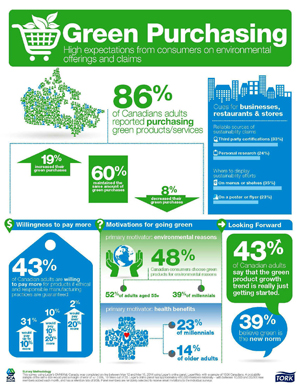
| Archive/Subscribe | TAPPI.org | Advertise | TAPPI Press Catalog | August 2014 |
SCA Survey Reveals More Canadian Consumers Shop for Green Products, Services
 Canadians are increasingly looking for green products and services, and many are even willing to pay more for them, but they may be selective on which they choose based on the strength of environmental claims. The findings, that suggest an important shift to mainstream green purchasing practices, are a result of an inaugural survey on green purchasing behaviors and attitudes in Canada commissioned by SCA, Oakville, Ont., Canada, maker of the Tork® brand of away-from-home tissue products. SCA worked with Leger in Canada to capture in-the-moment consumer insights that reflect market trends. Canadians are increasingly looking for green products and services, and many are even willing to pay more for them, but they may be selective on which they choose based on the strength of environmental claims. The findings, that suggest an important shift to mainstream green purchasing practices, are a result of an inaugural survey on green purchasing behaviors and attitudes in Canada commissioned by SCA, Oakville, Ont., Canada, maker of the Tork® brand of away-from-home tissue products. SCA worked with Leger in Canada to capture in-the-moment consumer insights that reflect market trends."The key takeaway for Canadian organizations is that 86% of Canadians are buying green, so products and services with environmental claims are likely a fundamental driver in a customer's purchase decision," said Mike Kapalko, sustainability marketing manager for SCA's North American away-from-home professional hygiene business.
However, most of those purchasers look for third-party certification (33%) or conduct their own research (24%) to verify claims. This fact combined with the knowledge that their prime purchase driver is the care of the environment itself (48%) rather than other motivations means organizations should showcase their environmental commitment beyond their direct business offer.
"It's not enough to say something is biodegradable or sustainable to keep ahead of the curve," said Kapalko. "If they haven't already, companies will need to determine how to incorporate meaningful sustainability strategies into their business and production practices. This could mean finding new suppliers with sustainable alternatives, or identifying operational areas of 'green improvement' that are cost effective and efficient."
Whether they are early adopters or just picking up on the trend, Canadians on the whole are strong believers in green products and services, with 43% believing that it is just getting started, and 39% believing it is the new norm, the study reveals.
An interesting nuance in the Canadian study is found in the age and family demographics of 'green shoppers.' While surveys in other geographies indicate a strong propensity for millenials (under 34) to lead the pack in adopting green purchasing habits, in Canada the survey results suggest that older green shoppers are more likely to do so because it is better for the environment (52% of Canadians over 55 versus 39% of Canadians under 34). In addition, households with children indicated a stronger likelihood to purchase green products and services (91%) than the 84% of respondents without children.
"A clearly optimistic finding of this survey is that 'green' products and services are no longer subjected to the forces of the economy," says Kapalko. According to the Tork Green Business Survey, for most 'green' consumers in Canada (60%), the recent economic changes have had no effect on the amount of green products or services they purchase. Actually, one-in-five (19%) 'green' consumers have increased their green purchase habits, while only 8% have decreased that amount as a result of economic conditions. Only one-in-six Canadians surveyed did not buy green products.
The 'green' profile of products and services is scrutinized now more than ever by Canadians, 43% of whom indicated they are more willing to pay more for products and services that are ethically and responsibly manufactured or delivered, to the tune of the following:
These findings are tempered by income levels and education, as Canadians with household income under $40,000 are less willing to pay more for a product manufactured ethically (58% versus 40% of Canadians with greater income).
This survey, using Leger's OMNIWeb Canada, was completed online between May 12 and May 15, 2014, using Leger's online panel, LegerWeb, with a sample of 1,504 Canadians. A probability sample of the same size would yield a margin of error of +/- 2.5%, 19 times out of 20, according to SCA.
In North America, SCA produces the Tork line of dispensers, towels, tissue, soap, napkins, and wipers used in commercial settings such as office buildings, restaurants, schools, and healthcare facilities and the TENA® line of incontinence care products used by consumers at home and in healthcare facilities.
|

